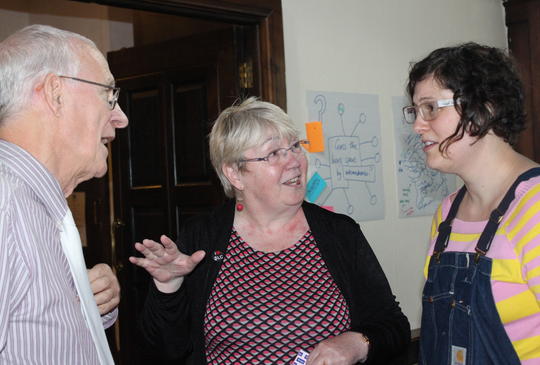
Q&A: Jessica Symons, Research Fellow at the University of Salford
Hi Jess, tell us a bit about what your research involves.
"My main research focuses on how organisational structures affect people's ability to develop their ideas.
As an anthropologist, I spend time in communities participating and observing people’s lives from the inside out.
Currently I am working in Ordsall, Salford on a 4 year AHRC funded ‘Cultural Intermediation’ project supporting people to develop their ideas for cultural activities.
We are working with 20 people whose ideas range from setting up beehives to running bike and craft workshops, to painting, filming and performing.
More broadly, I am interested in social futures, creative processes, urban dynamics and making academic research more accessible.
I take an ethnographic approach to my research which means that I decide on a particular set of themes, a specific geographical area and a community network and then I spend time with people situated within this ‘field’ and try to understand it from the inside out.
I look at how people make sense of their lives, what is important to them, what are the constraints on them and how they work within or push at boundaries."
Why did you choose this area of research?
"I chose anthropology because it aims to understand the underlying structures that shape how people interact with each other, be that cultural understandings, physical infrastructure, social codes, values and morals.
Over 10 years it has helped me understand not only how the world works but how I work as well.
I am not surprised by anything anymore - I have come to see the rich diversity of human behaviour as one of our greatest strengths as a species!"
Can you give some examples of how your work connects with different places and communities?
"My first main research project focused on the making of a civic parade in Manchester, the Manchester Day Parade, and I spent 18 months working alongside people from the council, parade organisers, artists and community groups helping put on the parade.
This stimulated a significant insight into the creative process which then influenced my current research project where I am researching how people engage with cultural activities in the Ordsall area in Salford.
I have spent a year hanging around in the Ordsall park area, Islington and Salford Quays, talking to people, volunteering and getting to know what people consider important in the area and what they like doing."
What are the implications of your work for a place like Greater Manchester?
"When I first went into Ordsall, I was warned that it was a dangerous area, one of the ‘most deprived’ in the city region. Well guess what, I have been delighted by how lovely and friendly the local people there are!
Obviously nowhere is perfect but its strong community networks and village-like feel next to Salford Quays on one side, and Manchester’s city centre on the other, makes it Greater Manchester’s best kept secret. But shhh! It may be that the locals like it that way!"
What are the highlights and challenges in conducting your research?
"When I first went into Ordsall, I was tasked with setting up a panel of local people to commission artworks. This developed into Ideas4Orsall a University of Salford research project supporting people's ideas and giving them a boost through the development and production process.'
I am very proud of the fact that so far we have managed to fund 20 local people’s ideas ranging from beehives, bike, cooking and craft workshops, to a popup museum, a local history play, paintings, films and performances."
So what next?
"I want to embed the learning from my research into future city debates. Currently much of the planning for future cities is led by commercial companies seeking to sell products and services.
They have persuaded academics, thinktanks, policy makers and government officials to think about ‘smart cities’ and ‘big data’ as an integral part of any future city.
Even environmental issues and sustainability activists are focusing on how technology can be used to solve urban problems.
I want to think about low-fi solutions – abstaining, reducing, downsizing and developing new ‘technologies’ which may not include a digital component at all.
I also want to explore how local people can be better engaged in planning for the future including having more control over their local resources."
For more information on Jess' community work in Ordsall, visit the Ideas4Ordsall website and Facebook page.
Perspectives Essay: How can sustainability be understood in Greater Manchester?
Contributed by Eamonn Boylann
Contributor Profile
Grace is a writer and editor here at Platform and also works as a Copywriter at Creative Concern.
She graduated from The University of Nottingham in 2013 with a degree in English and Creative Writing and afterwards interned within the editorial department of a number of publications, before securing a position as Assistant Editor at a Manchester based magazine.





